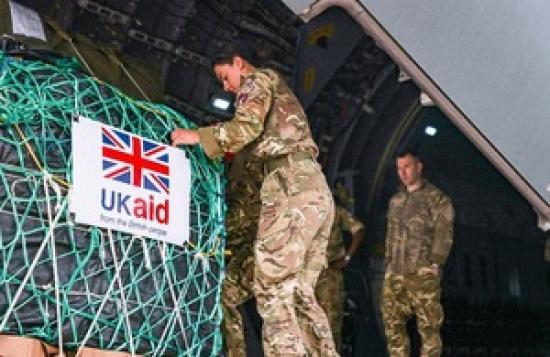UK Forces Airdrop Over 10 Tonnes Of Food Supplies To Civilians In Gaza
26th March 2024

The Royal Air Force airdropped over 10 tonnes of food supplies into Gaza for the first time on Monday (25 March 2024), as part of international efforts to provide life-saving assistance to civilians.
The aid, which consists of water, rice, cooking oil, flour, tinned goods and baby formula, will support the people of Gaza.
The Defence Secretary authorised the airdrop following an assessed reduction in threat to the military mission and risk to civilians.
An RAF A400M flew from Amman, Jordan to airdrop this aid along the northern coastline of Gaza, as part of the Jordanian-led international aid mission. UK personnel worked closely with the Royal Jordanian Air Force to plan and conduct this mission.
Defence Secretary Grant Shapps said, "The UK has already tripled our aid budget to Gaza, but we want to go further in order to reduce human suffering. Today's airdrop has provided a further way to deliver humanitarian support and I thank the RAF personnel involved in this essential mission, as well as our Jordanian partners for their leadership.
The hell that was unleashed by the October 7th Hamas attack has led to wide-scale innocent loss of life. The UK’s goal is to use every route possible to deliver life-saving aid, whether that is by road, air or new routes via the sea.
We also continue to call on Israel to provide port access and open more land crossings in order to increase incoming aid deliveries to Gaza.
The A400M is a highly capable tactical and strategic airlift platform and today’s airdrop was its first ever mission delivering humanitarian aid by parachute. Both RAF and British Army personnel participated in the mission. The drop zones were surveyed before and during the airdrop to ensure aid was delivered directly to civilians.
This airdrop is part of ongoing UK efforts to provide life-saving humanitarian assistance to the people of Gaza and follows recent land deliveries of 2,000 tonnes of UK food aid to feed more than 275,000 people and thousands of UK-funded blankets, tents and other relief items, as well as the establishment of a full UK-funded field hospital in Gaza run by British charity UK-Med. The UK remains committed to ensuring aid reaches those who need it most, as Palestinians continue to face a devastating and growing humanitarian crisis in Gaza.
The UK has previously supported international airdrops, providing around 600 parachutes at the request of Jordan and Bahrain and supplying critical aid for a Jordanian airdrop to Tal Al-Hawa Hospital in northern Gaza. Between October and November 2023, the RAF also delivered aid and humanitarian supplies to Egypt for distribution by the Egyptian Red Crescent and UNRWA.
The UK continues to work with allies, including Cyprus, the United States, European Union and United Arab Emirates, to open a direct maritime corridor to Gaza. UK defence planning teams are deployed in the United States and Cyprus to support this international effort and the Foreign, Commonwealth and Development Office is prepositioning aid in Cyprus. The UK Hydrographic Office has also shared analysis of the Gazan shore with US planners to help establish a temporary aid pier. In January, the UK worked with Cypriot partners to pre-screen 87 tonnes of aid that was delivered by Royal Fleet Auxiliary ship RFA Lyme Bay to the Egyptian Red Cross for the people of Gaza.
The UK is also focused on ensuring more aid can enter Gaza by land, working closely with Jordan who have been instrumental in facilitating the UK’s humanitarian response. Last week, more than 2,000 tonnes of food aid was distributed by the World Food Programme on the ground. This adds to the 150 tonnes of UK-funded relief items, including blankets and tents, which arrived earlier this month, distributed by UNICEF.
Alongside the latest deliveries of aid, the UK has announced a further £10 million in aid funding for the Occupied Palestinian Territories (OPTs), bringing the total spend to over £100 million this financial year. This funding will support UN agencies on the ground to deliver lifesaving aid and will also provide core relief items, such as tents, for the most vulnerable.
